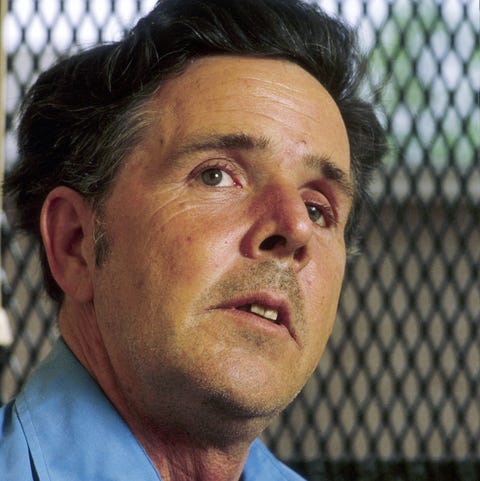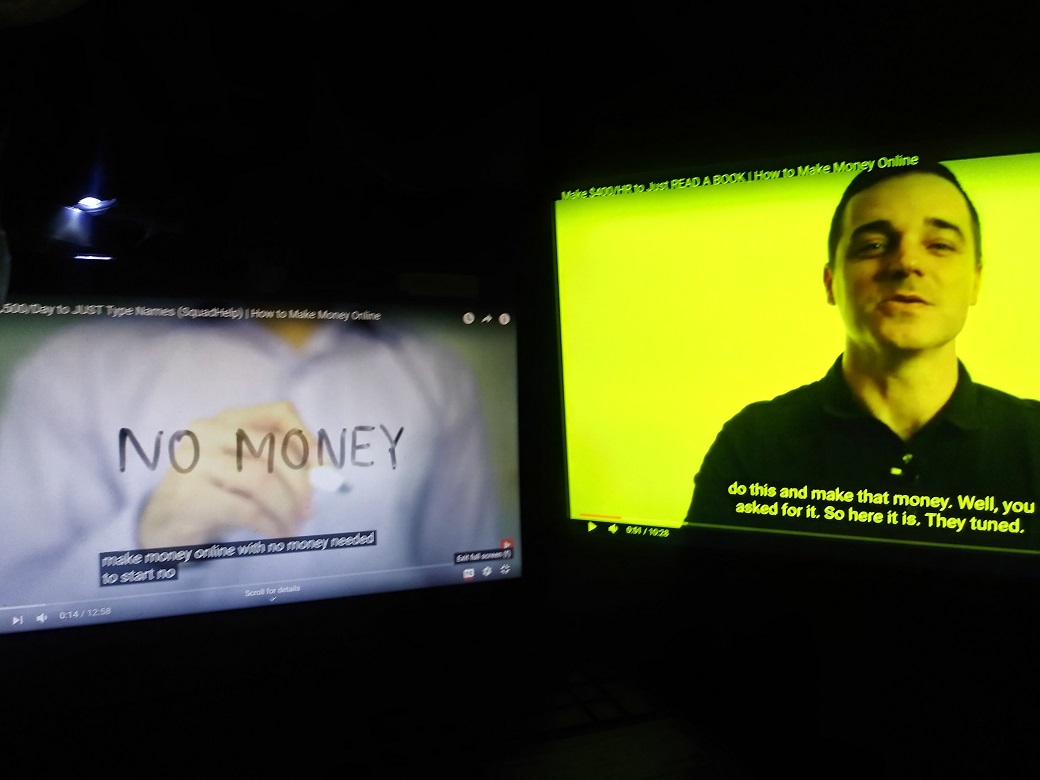
Robert Daemmrich Photography IncGetty Images
Heads up, true-crime junkies: Netflix has a new docuseries about the most prolific serial killer in America, and you’ve probably never heard of him. The Confession Killer digs into the curious case of Henry Lee Lucas, who admitted to killing 600 women in the span of eight years, then later retracted all his confessions.
Lucas first admitted to matricide in 1960. Then, he claimed he killed his young girlfriend and his 82-year-old landlord. While in custody for those crimes, he took responsibility for hundreds and hundreds of murders, mostly of women, all over the country. With each confession, Lucas closed a cold case, giving closure to the families of victims. Except, of course, most of his confessions were likely based on lies. Here’s what you need to know about the case before you dive into the documentary.
Who was Henry Lee Lucas?
Born in Virginia in 1936, Lucas had a droopy eye and an IQ of 87. He suffered abuse at the hands of his mother, Viola, a prostitute who reportedly forced him to watch her have sex with clients and cross-dress in public. At the age of 23, he was accused of killing her during an argument. After serving 15 years in a Michigan prison, he befriended a drifter named Otis Toole. Together, they cruised down I-35 in Texas looking for women to torture. Lucas later admitted to taking part in the violent deaths of hundreds of women.
Did he actually kill anyone?
Hard to say. Lucas confessed to killing his mother, his young girlfriend, and his 82-year-old landlord. During a court appearance in the landlord slaying, he stunned everyone by blurting out: “And I got at least a hundred more out there.” After that, he admitted to killing over 600 people in the most brutal of ways. But a 1985 investigation published by the now-defunct Dallas Times Herald discredited his claims, revealing how it was actually impossible for Lucas to have committed so many murders. A year later, Lucas retracted his confessions, crediting them to a “steady diet of tranquilizers, steaks, hamburgers and milkshakes” provided by investigators as bribes, according to the Associated Press. Ultimately, Lucas was only convicted of 11 murders.
Why did Lucas confess?
As The Confession Killer reveals, Lucas developed a friendship with the Texas law enforcement in charge of his case. He was often rewarded with milkshakes and cigarettes for confessing to a murder, and allowed to roam around without handcuffs. Why was law enforcement so desperate to pin that many murders on a single man? Jan Reid wrote in Texas Monthly‘s June 1985 issue that “nothing obstructs police promotions and discredits departments more than unsolved murder cases, and some cops will stoop to feeding a willing suspect information in order to obtain confessions and close the books on those unsolved killings.”
Some officers in Texas maintain he was a murderer but think his number of victims is much lower than 600. “I remember him trying to cop to one he didn’t do, but there was another murder case where I’ll kiss your butt if he didn’t lead us right to the deer stand where the murder took place,” one officer said, according to Texas Monthly. “Ain’t no way he could’ve guessed that, and I damn sure didn’t tell him. I think he did that one.”
Where is he now?
In 2001, Lucas died from heart failure at the age of 64 while serving a life sentence in prison. He is buried at a cemetery in Huntsville, Texas.
What’s happening with the cases he recanted?
Families of the victims are still left with many unanswered questions, but the directors of The Confession Killer hope the documentary is a vehicle for retribution. “We met with a lot of victims’ family members,” director Robert Kenner told The Guardian. “They’re still in pain—they want to know what happened to their loved ones…Justice was denied by what happened. And there’s a chance to reopen it, and I’m hoping the juries will and the series can bring about some comfort to the victims’ family members.”















tadalafil cialis
cialis generic name
https://paydailoanz.com/cialis.php – cialis buy
tadalafil liquid
generic tadalafil
https://paydailoanz.com/tadalafil.php – tadalafil citrate
levitra
levitra 20mg
https://paydailoanz.com/levitra.php – online levitra
levitra pills
levitra
https://cbdoilnumber1.com/levitra/ – online levitra
cialis prices
cialis 20 mg
https://cbdoilnumber1.com/cialis/ – cialis dosage
antivirus for windows 10 antivirus free download https://xantivirusx.com/ – norton antivirus xhamster dating dating daddy https://onlinedatingwow.com/ – dating online online-sweepstakes diy network sweepstakes https://supersweepstakesx.com/ – sweepstakes
mylan tadalafil tadalafil lilly 5mg prix generic cialis tadalafil tadalafil 5 mg tadalafil prix en pharmacie
tadalafil reviews tadalafil generique tadalafil dosage tadalafil 5mg tadalafil 5 mg
https://supertadalafil.com/ – tadalafil cialis
tadalafil lilly 5mg prix tadalafil dosage tadalafil generic side effects for tadalafil cialis-impuissance tadalafil
tadalafil vs sildenafil tadalafil generic vs cialis generic cialis tadalafil tadalafil pronunciation tadalafil 10 mg
https://xtadalafilx.com/ – generic tadalafil
You might have assumed one could have a far greater sexual performance?.
Roulett spielen – casino roulette – best roulette in vegas
how to lose weight quick golo weight loss scam apple cider vinegar weight loss weight loss medications best weight loss pills
lose weight fast best diet for weight loss how to lose weight what is noom weight loss program diet plans
https://weight-loss-blogs.com – jorge garcia weight loss
generic cialis
generic cialis online
https://wowcialisnow.com/# – generic cialis online
great lakes loans small business loans caliber home loans consolidation loans home equity loans
car loans my quicken loans login lawrence o’donnell trump loans student loans loans
https://paydailoanz.com/# – students loans
http://www.radiollanuradecolon.icrt.cu/colectivo-del-hospital-de-colon-realiza-acciones-en-homenaje-al-aniversario-57-de-la-fundacion-del-centro/?unapproved=682794&moderation-hash=3cc0c7b8b9ada00e0ff8456da7639a35#comment-682794
http://www.bnnews24.com/news/details_news/2327/5
https://dieppe-aluminium.com/produit/woo-album-1/#comment-47672
https://moslemjourney.com/aturan-baru-pengguna-lampu-jarak-aman-dan-batas-kecepatan-kendaraan/#comment-6773
http://senclic.com/sports/football-as-monaco-a-quoi-va-ressembler-le-premier-onze-de-robert-moreno/?unapproved=2270889&moderation-hash=ad8e1c6a8d2cd5c12e6499822994a4e5#comment-2270889
Hello from United States. I’m glad to came here. My first name is Lieselotte.
I live in a small city called Alexandria in nothern United States.
I was also born in Alexandria 39 years ago. Married in October year 2001.
I’m working at the university. http://aaa-rehab.com
treatment of native american substance abuse detox treatment plan rehabilitation centers in tampa fl cocaine withdrawal treatment center for substance abuse treatment
Free Methadone Clinic Substance Abuse Programs For Youth alcohol rehab sioux falls sd Free Drug Rehabilitation Center Substance Abuse Treatment Near Me
http://www.arizona-inpatient-drug-rehab-centers.drugrehabssr.com